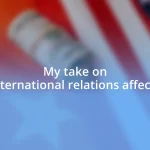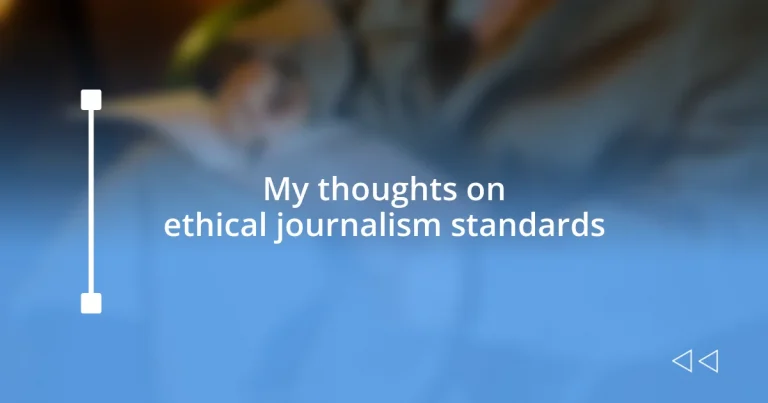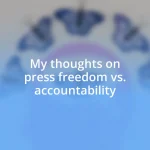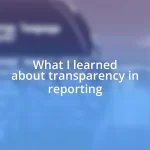Key takeaways:
- The foundation of ethical journalism is built on truthfulness, fairness, and responsibility, which shape public perception and credibility.
- Challenges such as media bias, the rapid pace of news, and external pressures can compromise ethical reporting, emphasizing the need for objectivity.
- Future ethical standards will evolve with technology and audience dynamics, necessitating collaborative efforts among journalists and informed public engagement.
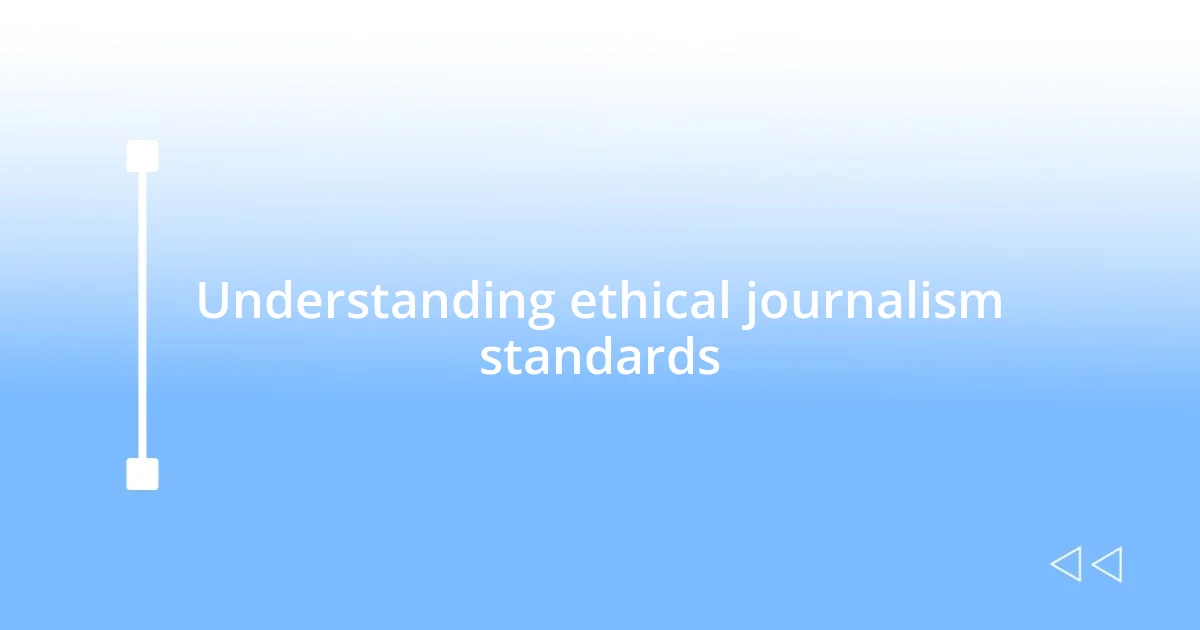
Understanding ethical journalism standards
Ethical journalism standards serve as the foundation for credible reporting. I remember a time when I was faced with a story that could have easily misrepresented the facts; it was a pivotal moment that reinforced my belief in accuracy. Isn’t it fascinating how a single piece of information can shape public perception?
Moreover, these standards emphasize truthfulness and fairness, which I believe are essential in building trust with the audience. I’ve often found that readers appreciate when journalists not only present the facts but also acknowledge different perspectives. Have you ever considered how a balanced portrayal might influence your own understanding of an issue?
On a deeper level, ethical journalism pushes us to consider the wider impact of our reporting. There was an instance in my early career where I wrote a piece that inadvertently harmed a vulnerable community. That experience taught me that with great power comes great responsibility. How do we ensure that our stories don’t just inform but also uplift? By adhering to ethical standards, we can navigate this complex terrain responsibly.
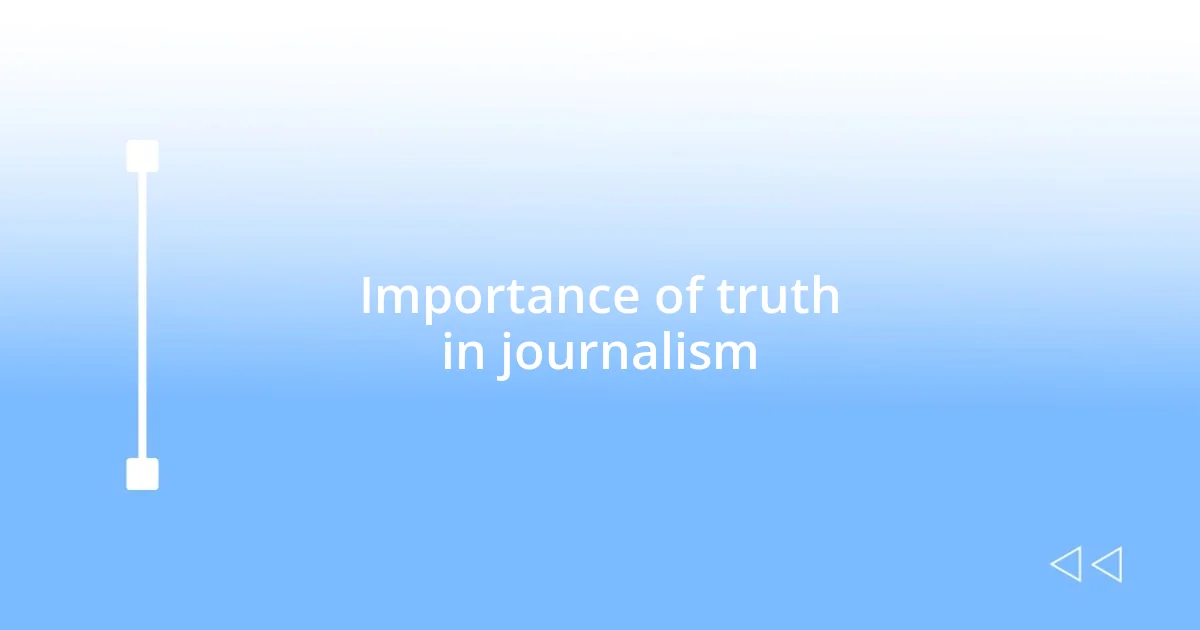
Importance of truth in journalism
The truth in journalism isn’t just a principle; it’s the lifeblood of the profession. I recall a particular instance during my reporting days when a minor error slipped through—nothing major, just the wrong date mentioned in a follow-up article. But the fallout was astounding. Readers were confused, and debates sparked up as people took to social media. This experience taught me that even small inaccuracies can tarnish credibility and lead to a chain reaction of misinformation.
Every article we publish holds power, and the truth is our greatest ally in upholding that power responsibly. When I interviewed a local activist about a pressing issue, I was careful to convey not just their words but the passion behind them. I felt that the emotion in their voice was as crucial as the facts presented. This moment illustrated how truth, combined with authenticity, resonates deeply with audiences, often inspiring them to engage with the world around them.
The ripple effect of journalistic truth extends far beyond the page; it shapes the public discourse. I once wrote an exposé on environmental issues which attracted community concern and led to actionable change. Seeing the impact of my work unfold in real life was exhilarating and humbling. It reinforced for me that every truth we uncover has the potential to ignite conversations, and sometimes, even change lives.
| Aspect | Impact of Truth in Journalism |
|---|---|
| Credibility | Enhances trust between the media and the audience. |
| Public Discourse | Shapes conversations and influences opinions on key issues. |
| Empowerment | Gives voice to the underrepresented and drives societal change. |
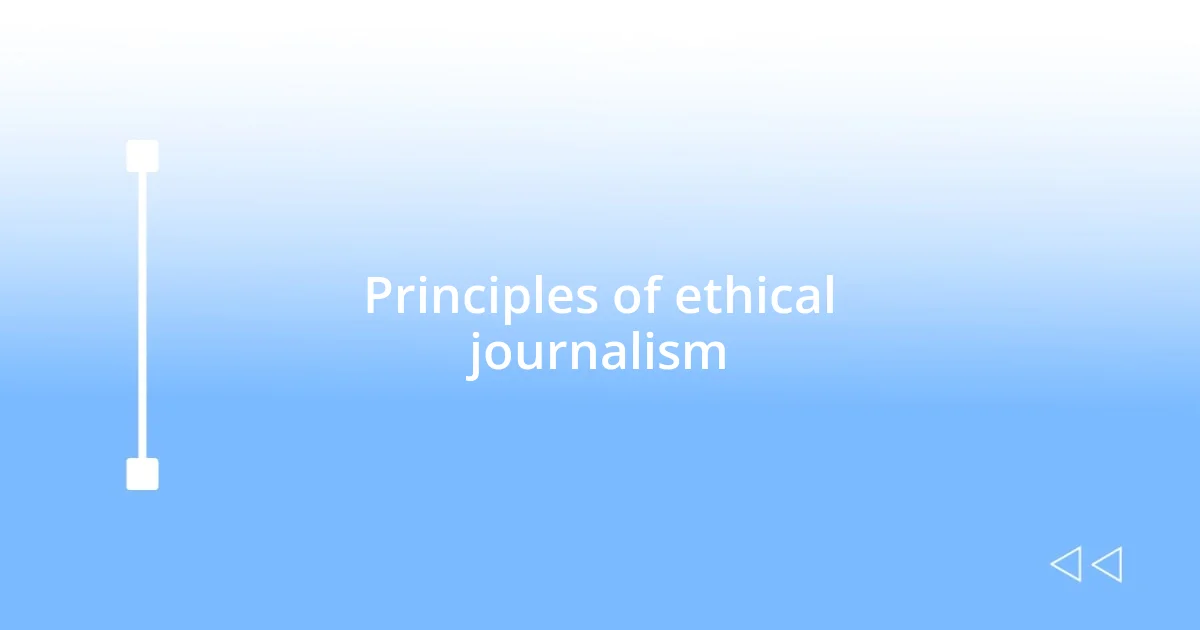
Principles of ethical journalism
Ethical journalism is grounded in key principles that provide a framework for responsible reporting. I often reflect on the importance of accuracy, which I realized during a challenging assignment. When I was tasked to report on a sensitive political matter, I triple-checked every fact and quote to avoid any misinterpretations that could mislead the audience. This experience cemented for me that ethical journalism isn’t just about facts; it’s about delivering them accurately, with consideration of the context.
Key principles of ethical journalism include:
- Truthfulness: Ensuring that information is accurate and factual, which builds trust with the audience.
- Independence: Maintaining objectivity by avoiding conflicts of interest that could compromise reporting integrity.
- Fairness and impartiality: Giving all relevant sides of a story a fair chance to be heard, allowing readers to form their own opinions.
- Accountability: Accepting responsibility for the published content, correcting errors, and being transparent with audiences.
- Minimizing harm: Being sensitive to the consequences of reporting, especially when it comes to vulnerable populations.
In my experiences, I’ve learned that these principles are interwoven with ethics. There was a remarkable occasion when I worked on a piece about community health. The initial draft was focused solely on statistics, but after some soul-searching, I decided to include personal stories from residents. This shift transformed the article, resonating with readers on an emotional level and driving home the impact of the health crisis in a way numbers alone couldn’t convey. It underscored to me that ethical journalism demands empathy alongside adherence to facts.
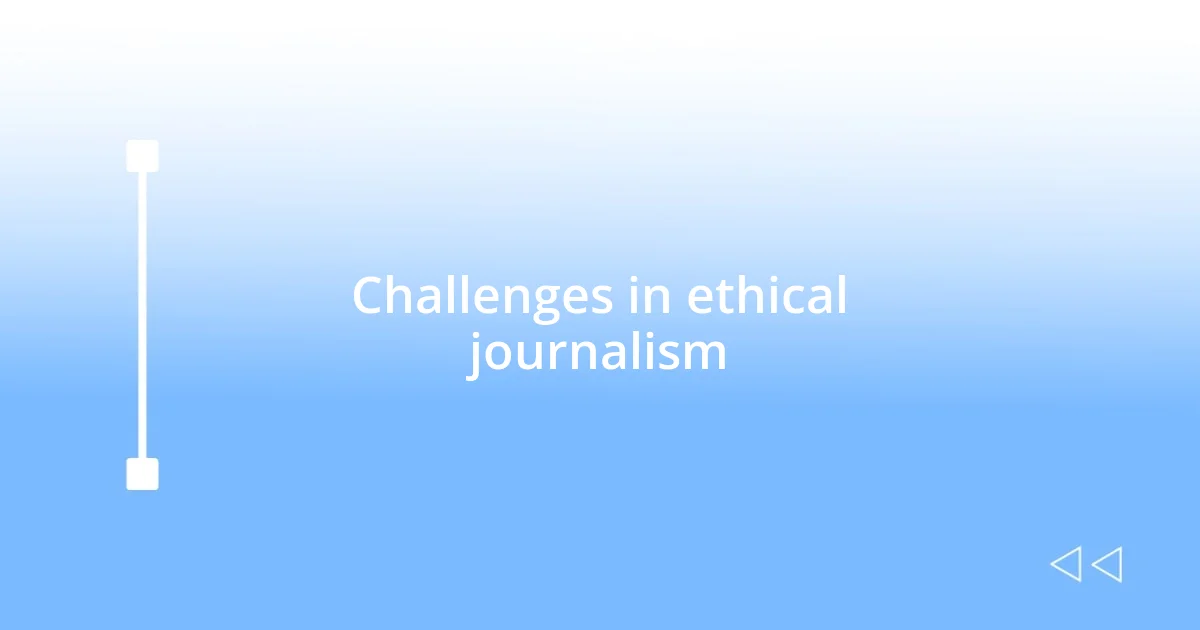
Challenges in ethical journalism
Ethical journalism faces numerous challenges that can complicate the pursuit of truth. One instance that stands out for me was when I covered a story involving a sensitive crime issue in my community. While aiming to report accurately, I encountered pressure from some local voices who wanted me to sensationalize the story to attract more readers. I had to grapple with the urge to pull in the audience versus the responsibility I felt to respect the victims’ privacy and dignity. That experience truly illuminated the delicate balance we must maintain in our storytelling.
Another hurdle arises from the rapid pace of news in today’s digital age. I remember rushing to cover an urgent political event and nearly submitted an article packed with unverified information because the demand for content was so high. It made me realize how easily the pursuit of speed can overshadow accuracy. Isn’t it alarming how in our race to be the first, we sometimes forget to be the most responsible? This revelation reinforces my belief that we must slow down, check our facts, and prioritize ethical reporting over being first on the scene.
Lastly, the landscape of media bias poses a significant challenge. I’ve found that my personal views can unintentionally influence my storytelling. I once covered a controversial environmental policy, and the weight of my opinions almost seeped into the narrative. It forced me to reflect: How can we, as journalists, ensure our biases don’t taint the stories we tell? It was a tough lesson that highlighted the importance of objectivity, reminding me that our job is to inform, not persuade. These challenges are constant reminders of the commitment we must uphold to ethical standards in journalism.
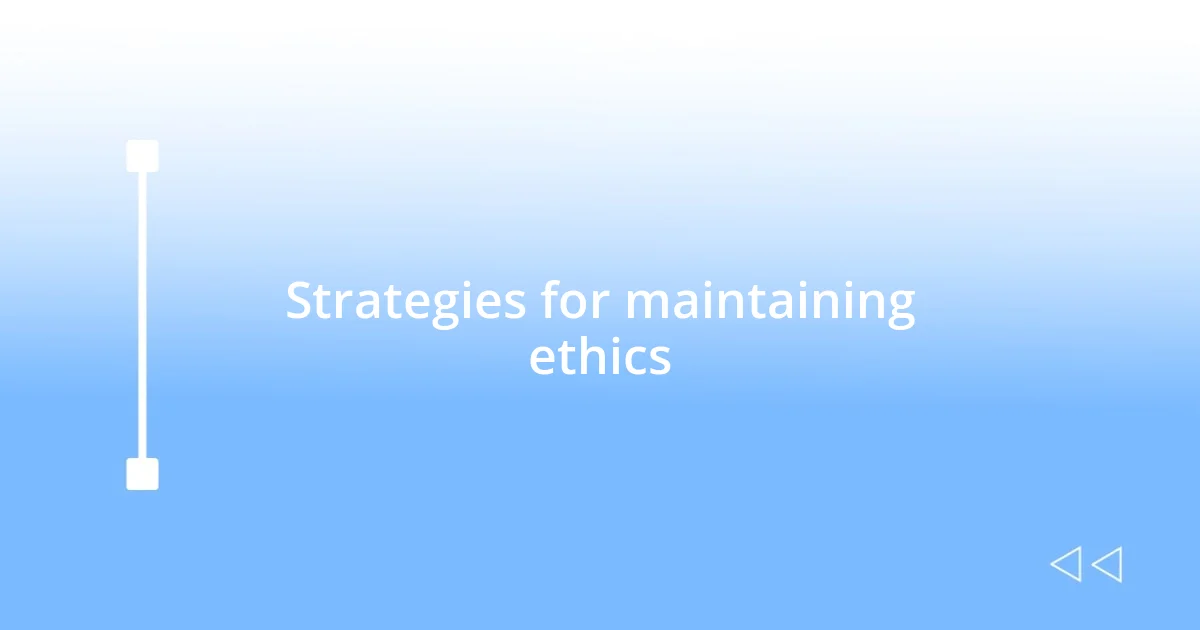
Strategies for maintaining ethics
To maintain ethical standards in journalism, one proactive strategy is developing a strong network of peer accountability. I vividly recall a situation during my early years in journalism when I felt unsure about a piece I was working on. In those moments, I would turn to fellow journalists for feedback, and their insights not only helped refine my article but also reinforced my commitment to ethical reporting. This network acts like a safety net; it provides differing perspectives that can illuminate potential biases or ethical lapses one might overlook.
Another method that has proven invaluable is establishing clear internal guidelines for ethical decision-making. Reflecting on my work environment, I remember when we adopted a comprehensive ethics policy that encouraged open discussions about challenges we faced. The policy didn’t just sit on a shelf—it sparked conversations that made us more vigilant about our journalistic duties. It became our moral compass, ensuring that even in high-pressure situations, like breaking news coverage, we could pause and align our actions with our ethical standards.
Additionally, continuous education about emerging ethical dilemmas helps journalists stay informed. I often participate in workshops and seminars that tackle contemporary issues we face in reporting. These learning opportunities have often challenged my preconceived notions, making me question: Am I truly understanding the implications of my reporting choices? Each session has been an eye-opener, reminding me that the landscape of journalism and ethics is ever-evolving. Engaging with these changes empowers me to uphold integrity while adapting to new challenges, ensuring that ethical journalism is not just a principle but a practice I live by daily.
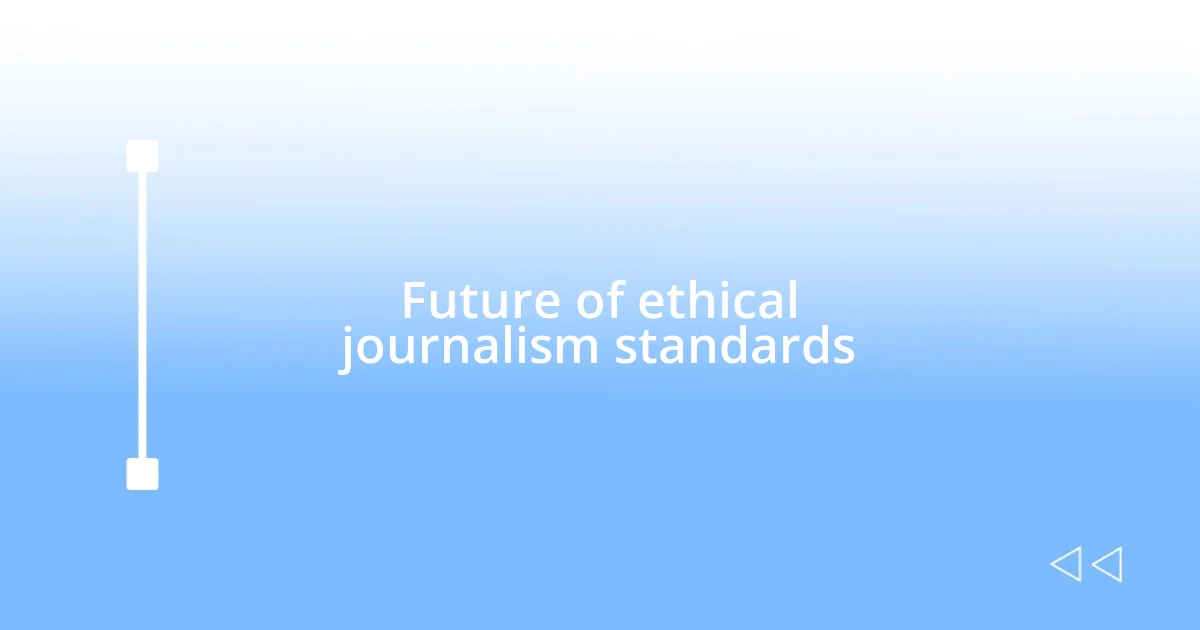
Future of ethical journalism standards
The future of ethical journalism standards is undoubtedly more complex than ever. Recently, while attending a seminar on media integrity, I was struck by a speaker who argued that the rise of artificial intelligence is reshaping our landscape significantly. Imagine the ethical dilemmas we’ll face with AI-generated content! It made me ponder: how do we ensure that such tools do not compromise the accuracy and integrity of our reporting? Implementing robust ethical guidelines that encompass technology could be essential for preserving trust in journalism.
I’ve sensed a stronger movement towards collaborative journalism, where journalists unite across different platforms to uphold ethical standards. There was a moment in my career when I worked alongside journalists from diverse backgrounds on a joint investigative piece. We learned from each other’s experiences, which not only enriched our findings but also reinforced the idea that shared ethical values can cultivate accountability. It’s encouraging to think that in the future, this collaborative spirit could strengthen our commitment to audience trust.
Moreover, as information becomes increasingly decentralized, the public’s role will likely evolve. Can we empower audiences to be more discerning consumers of news? I recall a thought-provoking discussion I had with a group of undergraduate students who were passionate about redefining the way they engage with media. Their desire to hold journalists accountable revived my optimism about the future. It reinforced my belief that ethical journalism is a two-way street, reliant not only on the journalists’ integrity but also on an informed and engaged audience. Together, we can foster a culture where ethical journalism thrives.








